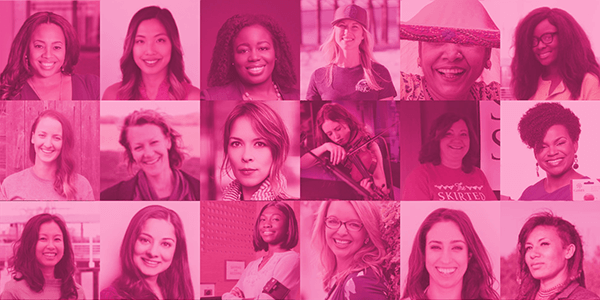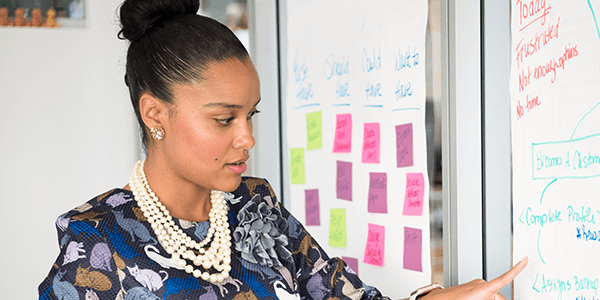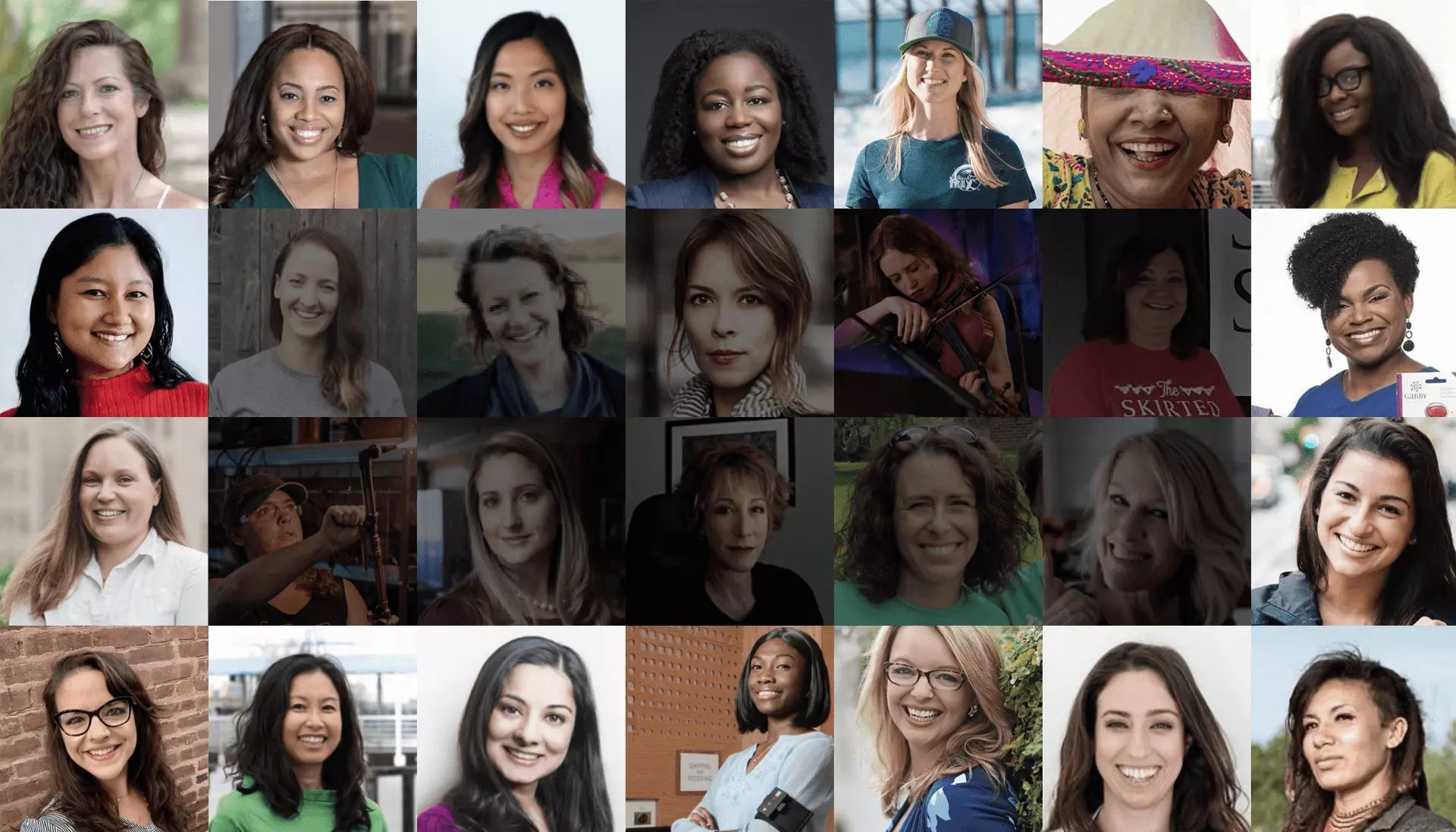

February 20, 2024
January 2024 Startup Grant Awarded to Zemlia

Zemlia
Woman Entrepreneur:
Ania Korsunska
Her Website:
https://www.zemlia.co/
We’re excited to announce the $10,000 Startup Grant recipient for January 2024. Congratulations to Ania Korsunska, founder of Zemlia.
Recently, WomensNet Advisory Board member Jama Hernandez sat down with Ania for an exclusive interview. You can listen to their conversation and view the transcript below.
Video Transcript
WomensNet: Hi everyone, this is Jama with WomensNet. We’re so excited to introduce to you our 2024 January Startup grant winner — Ania Korsunska, the founder of Zemlia.
Thank you so much for taking the time to be with us. Let’s begin. Can you please tell us about Zemlia?
Ania: We’re on a mission to simplify decision making. So we’re tackling quite a big problem for folks of just cognitive overwhelm. We’re seeing trends that a lot of people want to adjust their lifestyle and match their values to their decision making. But there is just so much information out there, so little time and so much anxiety around decision making.
So we’re building a platform that helps drive decision making towards holistic sustainability. So thinking about health outcomes, financial independence and environmental impact… how do we take the 35,000 decisions, apparently, based on some research, that we make every day as humans, and align those decisions towards a long-term, sustainable roadmap for our life, but also how do we make incremental changes, to be moving forward and unlock that cognitive overwhelm.
WomensNet: Wonderful. There’s so much information overload and it’s hard to decipher what’s legit and what’s not legit about sustainability and living more holistically. So tell us maybe a little bit about what makes your business stand out from what other people are doing?
Ania: Yeah, that’s a great question, and something as an early stage startup, we have been thinking about, 24-7. I think there’s a lot of players in this space, and I see as Zemlia as kind of a partner rather than a competitor. But I think what’s missing is kind of a higher level approach that helps people think across all areas of their life.
There’s a lot of really great niche solutions. So if you’re a homeowner and you wanna electrify your house, there’s companies that focus on that. If you want to look at your financials, there’s a company for that. There’s all these kinds of niche solutions, but as a human being, you don’t think of all of those parts of your life as separate. And that would require you to work with all these different companies.
And there’s different apps that use kind of a more carbon footprint model. So we’re taking a different approach in the fact that we’re very broad — we’re looking across all areas of your life and try to make, again, decision making easier. So we’re not building maybe necessarily the depth of expertise in each area, but looking to partner with existing niche solutions. But having that higher level of, like, across all of these things, how do you make a plan and start to make incremental changes? Thinking again across like health, financial, and environment. So not necessarily putting climate front and center, and also going a little bit away from this carbon footprint model, but thinking of more of what you can contribute and, and empowering individuals to act where they can.
We’ve seen that the carbon footprint model causes more anxiety than action for folks because it’s very much of like, ‘how bad are you and how much harm are you causing?’ Which for some people is inspiring to act. But it’s a kind of a scarcity mindset of like, ‘I can’t fly, I can’t eat meat, I have to give up everything and become smaller…’’ because you wanna minimize your impact, but that gets people to shrink. Which causes, again, this anxiety of like, ‘every action I take has harm.’ So we’re trying to counter that with a more holistic, very data-driven, but very people- centered approach.
So really embodying the mentality of meeting people where they’re at, and acknowledging that not everybody needs to be perfect, or even aspire to be perfect, but what can each individual do based on their budget, where they live, what their values are, and where they wanna go within their long-term life roadmap. And how can we kind of look at these three aspects of your life, which everybody, I think can agree that everybody cares about health costs and their impact on, the quality of the air where they live, and living in a climate that is not too hot or has catastrophic fires and droughts.
So what we’re seeing, how do we start to empower people to take the decisions that they make on a daily basis and feel empowered to act. So trying to both position ourselves as this umbrella solution, but also countering some of the conversations to a more positive point of view.
WomensNet: I love that because you’re also meeting people where they’re at and even sometimes we think living holistically or more sustainably — it’s not affordable, it’s not practical. And so it sounds like you’ve really created a roadmap where people will be able to find an individualized way in which they can lead a much more meaningful life. And so that’s a really beautiful thing.
Ania: Yeah. Thank you.
WomensNet: You have gone through so many lessons in your journeys as a business woman and founders of a company. And so Ania…as a startup, how can the WomensNet Network show support for your business?
Ania: Yeah, that’s a great question. I definitely relate to the idea of iteration and being prepared for all the problems. I think if we were to write our own job descriptions, I think as founders, or presidents, CEOs, whatever the title…I think if we were to write that job description, I feel like contingency planning, being prepared for problems and quick problem solving and strategic shifting is kind of our main job description. That and fundraising… it’s a very strange job that you get self-assigned when you start a business. Since we’re a tech company, we don’t have a physical product that you can try, but we are building our initial version of our tool.
Just to give a quick overview, we’re building a trifecta of solutions. ‘Cause we feel like, again, holistically, it’s gonna take more than one thing to help solve this problem. So we’re building a set of personalized solutions that can give you a plan, but also help with that step-by-step guidance. So it’s part AI sidekick that’s trained on your data that can give you guidance and recommendations that are specific for your situation. So you don’t get generic, one size fits all advice.
There’s a community aspect because I think that’s so incredibly important to connect with others that are struggling with the same kinds of problems, maybe even in your area that you can connect with and kind of do peer learning and support. And then having data dashboards.
So being able to create a profile and log in and actually see your impact over time. So a lot of these solutions, you don’t feel them when you actually implement something like this. So say, you know, if we’re thinking about the environmental aspect of things, if you install solar panels, maybe your solar panels come with an app and you can see how much energy you’ve generated. But other things are not as as clear. So example, if you have a specialized recycling service that you sometimes even have to pay for, you don’t feel all of the recycling that you do, or if you install something like a low flow shower faucet, you don’t feel all of the wet water that you’re saving.
So you don’t feel that satisfaction. You feel that you’re paying for it, which is kind of a negative part of it, but if you’re having positive impact, and health outcomes and finances, it’s again so difficult to visualize impact so broadly across everything that you’re doing.
So once you have your personalized plan, we really want to take those things that are invisible and be able to visualize them for folks, and be able to see them over time. Because a lot of these small actions that we do, they do accumulate over time, which is where we see impact on the individual level. There’s also systemic impact of like, you share things with your community and en mass…if all of us decide to do something, then together, we can impact real change, but on an individual level, you don’t get that satisfaction. So can we show the accumulation of your own impact, to kind of give you that satisfaction that can then, maybe inspire you to do more. Because you know that you can see that your real impact is actually shown to you in your data.
Which is another part of what we are hoping to achieve is, is be able to use data and AI, and have that be a benefit to individuals. We produce so much data online and a lot of our tools are free now. A lot of our social media tools and all of that data that we produce of things we like and things we buy…it’s not given back to you for your own benefit. It’s being sold for other purposes online.
So we as a company are exploring this idea of how can we use data and the developments in AI, and actually drive benefit for people individually and as a society as a whole. So giving the benefit of all the data you produce to help inform your decision making, and together we can have a better life individually and a better tomorrow together as a society. That’s very big, I know, but we’re very, very broad, big vision kind of folks here at Zemlia.
WomensNet: But we love the fact that you can even just celebrate or even reflect on the positive things that we have done. I don’t use the big laundry soap bottles anymore. I use these papers and I throw ’em in, and then even the envelope is recyclable, and so I love it and it’s amazing, but how awesome would it be to measure that. I know it’s a good thing what I’m doing, but just to have that joy factor… and don’t we all need a little bit of joy in our life?
So I really love that. It’s based on not the fear-based doom and gloom. We all know the climate crisis that we’re going through and even any crisis, whether it’s physical, emotional, all sorts… we either are going through ourselves or we know a loved one that is. And so it’s just coming from a positive place. So that’s very awesome.
Ania: Yeah. So for your example, to be tracking the amount of plastic that you are saving from from landfills, from that specific decision. ‘Cause otherwise you don’t see the plastic that you don’t buy. That’s not something you track, but you can potentially visualize, somewhere in the landfill like over a year, you would’ve made this mountain of plastic. But that doesn’t exist anymore.
You don’t feel what doesn’t exist, but can we give you that credit, basically, for all that you do? And I just actually realized I gave you context, but not actually the answer to your question. What the women in the network can do is you can go to our website, so it’s zemlia.co
and you can actually sign up for our wait list.
We’re developing the first version of our tools within the next month or so. So if anybody’s interested in being the first tester cohort of folks that get in there, that’s incredibly valuable for early stage startups…as we’re trying to figure out exactly what we’re building, how we’re building, we need as much input, and as diverse a population as possible to use our tools to give us feedback.
So as many people as potentially could be interested, to sign up for that wait list, just being on the wait list is a good sign, but then actually coming in, using the tools, giving us feedback, would be incredibly valuable. So that’s our ask, if anybody’s interested.
WomensNet: Wonderful. And so there you have it, WomensNet network, our January 2024 Startup grant winner. We look forward to your updates at the end of the year. And we do also look forward to learning along the way all the wonderful things that you’re doing. We do follow you guys on socials, and also any emails you have to let us know, please continue to let us know, ’cause it makes us super excited when we all celebrate your successes.



















